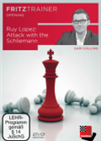It's Schliemann time!
This week's pair of games are by John Chernoff, an American who lives in Arcata, California, which is roughly 300 miles north of San Francisco. He got in touch with me at the beginning of this month with five games nicely annotated and with very amusing introductions. (My lead time is very short at the moment so please do send your games in!)
He writes:
 In this DVD Sam Collins provides a complete and detailed repertoire for Black. Numerous novelties and improvements are suggested, with the conclusion that White has no clear route to an opening advantage.
In this DVD Sam Collins provides a complete and detailed repertoire for Black. Numerous novelties and improvements are suggested, with the conclusion that White has no clear route to an opening advantage.
 I was born in 1973 and work as a pianist for a Humboldt State University.
I was born in 1973 and work as a pianist for a Humboldt State University.
Outside of chess, my hobbies include reading, writing, programming, and cheese. Well, the cheese is basically just something I eat, but still. Perhaps of some interest might be a chess to music application I'm currently working on. I am also developing an financial chart to music program that I will likely call "Stockhausen", but I digress.
Being in such an isolated area has limited my OTB chess, but I am fairly active online as "ZugAddict" and "GargleBlaster". For the latter I've a chess blog which I haven't written for in years but sometimes think of resuming. I'm also considering starting a web page as I hear that's now definitely a thing people do.
Oh, one other thing — during my brief visit to Europe (and England, which I have on good authority to, in spite of recent developments, still be technically part of Europe) in 2011 I did post something to the English Chess Forum about my initial impressions of the Old World which turned out to generate a very small flash of notoriety and, more importantly, a free banana on my board for the first round of the 2011 Guernsey Open.
Of the five games, I've chosen one disastrous Agony and a nice victory and I may well use some of the others anon. We start with the Agony and as usual, I've added my comments as JS.
Click or tap the second game in the game list below the board to switch
In computer chess there is no getting past Komodo, a two-time ICGA Computer World Chess Champion. Find out how Komodo can take your game to the next level!
Submit your games and win free Premium!
 At the airport, in the hotel or at home on your couch: with the new ChessBase you always have access to the whole ChessBase world: the new ChessBase video library, tactics server, opening training App, the live database with eight million games, Let’s Check and web access to playchess.com
At the airport, in the hotel or at home on your couch: with the new ChessBase you always have access to the whole ChessBase world: the new ChessBase video library, tactics server, opening training App, the live database with eight million games, Let’s Check and web access to playchess.comDid you enjoy the column and instructive analysis by GM Jonathan Speelman? Do you wish you could have a world-renowned grandmaster analyzing your play? You can!
To submit your games just upload a PGN or ChessBase file, along with your name and e-mail address. Send one success story (Ecstasy) and one loss (Agony).
Tell why you chose them, where or when they were played. Please also include your email address, so Jon can reply, and preferably a photo of yourself for our article.
If your game is selected Jon will contact you personally, and not only will you get free detailed commentary of your games by one of chess’s great authors and instructors, and former world no. 4 player, but you also win a free three-month ChessBase Premium Account!
A three-month Premium subscription to ChessBase Account means you get:
- Premium access to the Playchess server with ratings, simuls, lectures, and live commentary of top games
- Access to all Web apps with no restrictions, such as the Cloud database, and more!
- Full access to the Video archive, which not only includes all the past lectures by Daniel King, Simon Williams and others, but also a large number of full ChessBase products you would normally need to buy in the ChessBase Shop but that you can view for free as a Premium subscriber.
See also:


















 I was born in 1973 and work as a pianist for a Humboldt State University.
I was born in 1973 and work as a pianist for a Humboldt State University.




